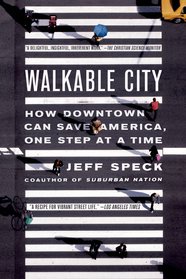Transcript
The financial and ecological costs of driving, and the time we waste sitting in traffic jams, is leading many people to think about a more ‘walkable’ city. The man who has thought and written most widely on this is city planner and architectural designer Jeff Speck, the author of ‘Walkable Cities – How Downtown Can Save America One Step at a Time. Craig Barfoot interviewed him for Pod Academy.
In rural, tribal societies with no technology, people move on average at three miles per hour because they are walking everywhere. In most developed countries, if you add up the costs of driving a car, the time you spend earning that money and the time you spend in traffic, it has been estimated that we, too, move at about 3 miles per hour!
Building new roads is no answer because the extra capacity is absorbed within 2 or 3 years by new car journeys. A better solution might be to price driving at its true cost to society, and Jeff points to London’s congestion charge as one of the successes of this approach.
But his big idea is ‘the walkable city’. We have learned that we have a smaller carbon footprint and a healthier population if we live in walkable cities. More and more young professionals (brought up on Seinfeld, Sex in the City and Friends) are opting to live in city centres, as are empty nesters who want to be able to get out and about even when they can no longer drive. As Jeff says, “Downtown has become the new place of choice for those who have a choice.”
But those who don’t have a choice are pushed towards the suburbs and transport costs they can ill afford, where ‘they require hyper-mobility just to buy catfood!’
So city centres are changing fast. They are increasingly seen as desirable places to live. The next question is whether the young professionals in their twenties will stay in the centre, or move out to the suburbs ‘for the schooling’ when they have children.
Jeff Speck’s Ted Talk about walkable cities is here
And you might also want to listen to our podcast on Walking tours of London, Is London like it used to be?



Subscribe with…